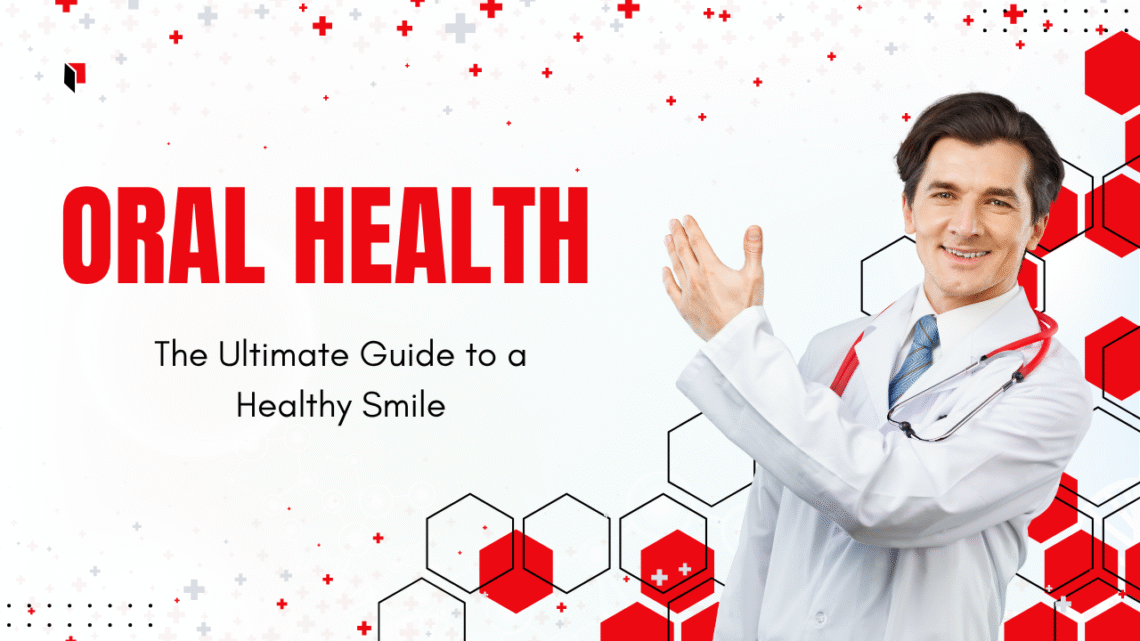Oral health is a vital part of your overall well-being, yet many people tend to overlook the importance of taking care of their mouth, teeth, and gums. Good oral hygiene doesn’t just prevent cavities and bad breath; it also plays a crucial role in preventing serious health issues like heart disease, diabetes, and infections. This comprehensive guide will walk you through everything you need to know about maintaining excellent oral health and provide you with the top 8 essential tips to keep your smile bright and healthy.
Understanding Oral Health

Oral health refers to the health of your entire mouth, including teeth, gums, tongue, and other tissues. A healthy mouth allows you to eat, speak, and socialize without pain or discomfort. Oral diseases like cavities, gum disease, and oral cancers can cause pain, disfigurement, and even systemic health problems if left untreated.
The mouth acts as a gateway to the body, and poor oral health can increase your risk for other chronic conditions. For example, gum disease has been linked to cardiovascular disease because bacteria from inflamed gums can enter the bloodstream and cause inflammation elsewhere. Additionally, oral infections can worsen diabetes control, and poor oral care during pregnancy is associated with premature births.
Because of this, oral hygiene should be a daily priority, supported by regular dental visits and a healthy lifestyle.
The Most Common Oral Health Problems
Before diving into how to care for your mouth, it’s important to understand the common issues that can affect your oral health. Knowing these problems helps you recognize symptoms early and take proactive steps to maintain a healthy smile.
Some of the most frequent oral health issues include tooth decay, also known as cavities, which occur when plaque bacteria erode the enamel. Gum disease is another widespread problem, starting as gingivitis and potentially progressing to more severe periodontitis if untreated. Both conditions can lead to pain, inflammation, and tooth loss if not properly managed.
Other common concerns related to oral health include persistent bad breath, tooth sensitivity, and even more serious conditions like oral cancer. Understanding these problems highlights the importance of regular dental care and good hygiene habits to protect your teeth and gums over the long term.
- Tooth Decay (Cavities): Caused by plaque bacteria producing acids that erode tooth enamel, leading to holes or cavities.
- Gum Disease: Ranges from mild gingivitis (inflamed gums) to periodontitis, which can destroy the tissues supporting teeth and lead to tooth loss.
- Bad Breath (Halitosis): Often caused by bacteria in the mouth, poor oral hygiene, or medical conditions.
- Tooth Sensitivity: Discomfort or pain in teeth triggered by hot, cold, sweet, or acidic foods.
- Oral Cancer: Early detection through regular dental exams is critical for successful treatment.
Top 8 Tips to Maintain Excellent Oral Health
1. Brush Properly Twice a Day

Brushing your teeth is the foundation of good oral health. It’s essential to use a soft-bristled toothbrush along with fluoride toothpaste to effectively remove plaque and prevent tooth decay. Brushing at least twice daily—once in the morning and once before bed—helps keep your mouth clean and your teeth strong.
When brushing, make sure to clean all surfaces of your teeth, including the front, back, and chewing areas. Don’t forget to gently brush your tongue, as bacteria can accumulate there and affect your breath and overall oral hygiene. Thorough brushing supports healthy gums and reduces the risk of gum disease.
Using the proper brushing technique is equally important for maintaining oral health. Hold your toothbrush at a 45-degree angle to your gums and use gentle circular motions. Avoid aggressive scrubbing, which can wear down enamel and irritate gums. For optimal care, replace your toothbrush every three to four months, or sooner if the bristles become worn.
2. Floss Daily
While brushing effectively cleans the surfaces of your teeth, flossing plays a crucial role in maintaining excellent oral health by removing food particles and plaque from between teeth where a toothbrush can’t reach. This area is a common spot for bacteria buildup, which can lead to cavities and gum disease if not properly cleaned.
To floss correctly, take a gentle approach by sliding the floss between your teeth without snapping it. Curve the floss into a “C” shape around each tooth and move it up and down beneath the gum line to remove debris and plaque effectively. This technique helps protect your gums from damage and ensures thorough cleaning.
Consistency is essential for flossing to benefit your oral health. Make it a daily habit to floss at least once a day, ideally before bedtime. Regular flossing complements brushing and helps keep your teeth and gums healthy and free from disease.
3. Use Mouthwash Wisely
Mouthwash can be a valuable addition to your oral hygiene routine, but it should never replace brushing and flossing. While brushing removes plaque from teeth surfaces and flossing cleans between teeth, mouthwash helps reach areas that these methods might miss, supporting overall oral health.
Fluoride-containing mouthwashes are particularly beneficial as they help strengthen tooth enamel and prevent tooth decay. Antiseptic mouthwashes are also effective in reducing plaque buildup and fighting the bacteria responsible for gingivitis, which can lead to gum disease if untreated.
If you have sensitive gums or experience dry mouth, choosing an alcohol-free mouthwash is recommended to avoid irritation. For best results, rinse your mouth with mouthwash for about 30 seconds after brushing and flossing. Incorporating mouthwash into your daily oral care can enhance your efforts to maintain a healthy and fresh mouth.
4. Eat a Tooth-Friendly Diet

Your diet plays a significant role in maintaining good oral health. Consuming too many sugary and acidic foods and drinks can lead to enamel erosion, which weakens your teeth and increases the risk of cavities. These substances create an environment where harmful bacteria thrive, contributing to tooth decay and gum problems.
To protect and enhance your oral health, it’s important to focus on nutrient-rich foods. Calcium-rich options such as dairy products—including milk, cheese, and yogurt—help strengthen tooth enamel and keep your teeth resilient against decay. Alongside calcium, vitamins from leafy greens, nuts, and fruits support healthy gums and overall oral hygiene.
By making smart food choices and limiting sugar and acid intake, you create a healthier environment in your mouth. This proactive approach can reduce the chances of dental problems and help you maintain a strong, healthy smile for years to come.
Crunchy vegetables like carrots and celery help clean teeth naturally and stimulate saliva, which protects against decay. Avoid frequent snacking and sugary beverages between meals to reduce acid attacks on your teeth.
5. Stay Hydrated with Water
Drinking plenty of water is essential for maintaining good oral health. Water helps rinse away food particles and bacteria from the mouth, which reduces plaque buildup—a leading cause of tooth decay and gum disease. Keeping your mouth clean throughout the day supports healthier teeth and gums.
Water also plays a crucial role in diluting acids produced by harmful bacteria. These acids can erode tooth enamel if left unchecked. Additionally, staying hydrated prevents dry mouth, a condition that reduces saliva production and increases the risk of cavities and infections, negatively impacting your oral health.
Choosing fluoridated water offers an added benefit by strengthening tooth enamel and making teeth more resistant to decay. To protect your oral health, it’s best to avoid sugary sodas and juices, as they can contribute to enamel erosion and increase the risk of dental problems over time.
6. Visit Your Dentist Regularly
Regular dental checkups and professional cleanings are vital for maintaining optimal oral health. These visits allow dentists to detect early signs of problems such as cavities, gum disease, or even oral cancer before they develop into more serious issues. Early detection ensures timely treatment and better outcomes.
Most dental professionals recommend scheduling dental visits every six months to keep your oral health on track. However, depending on your individual needs, your dentist might suggest more frequent appointments. Regular monitoring helps address any concerns before they worsen.
Professional cleanings during these visits are essential because they remove plaque and tartar buildup that regular brushing and flossing can miss. This thorough cleaning helps prevent decay and gum disease, supporting a healthier mouth. Prioritizing regular dental care is one of the best ways to maintain long-term oral health and a confident smile.
7. Avoid Tobacco Products
Smoking and chewing tobacco have serious negative effects on oral health. Tobacco use significantly increases the risk of developing gum disease, which can lead to tooth loss if untreated. Additionally, it raises the chances of oral cancers and causes unsightly staining of the teeth.
Tobacco also impairs the healing process after dental procedures, making recovery slower and more complicated. Furthermore, tobacco use worsens bad breath, impacting your confidence and social interactions. These harmful effects collectively damage your oral health and overall well-being.
If you currently use tobacco, quitting is the best decision you can make to improve both your oral health and general health. Seeking help from healthcare providers or joining cessation programs can provide the support and resources needed to successfully stop using tobacco. Taking this step will help protect your smile and enhance your quality of life.
8. Protect Your Teeth from Injury

Physical injuries can seriously impact your oral health, leading to chipped, cracked, or even lost teeth. To protect your teeth and gums during contact sports, wearing a properly fitted mouthguard is essential. This simple precaution can prevent many dental injuries and preserve your smile.
In addition to sports-related risks, certain habits can harm your oral health over time. Chewing ice, biting your nails, or using your teeth to open packages puts unnecessary stress on your teeth and may cause damage such as cracks or chips. Avoiding these habits helps maintain stronger, healthier teeth.
If you suffer from teeth grinding, known as bruxism, especially at night, it can wear down your teeth and affect your oral health. Discuss with your dentist the option of using a nightguard, which cushions your teeth and prevents damage during sleep. Protecting your teeth from injury is key to long-term oral health.
Oral Health Through Different Life Stages
Oral care needs evolve as you age:
- Children: Start oral care early, cleaning gums even before teeth appear. Teach proper brushing and flossing habits and schedule dental visits by age one.
- Teenagers: This group may face challenges with braces, dietary habits, and increased risk of cavities. Continue reinforcing good hygiene and encourage healthy eating.
- Adults: Maintain routine dental care and be mindful of lifestyle factors like smoking or stress that impact oral health.
- Seniors: Older adults may experience dry mouth, receding gums, or wear dentures. Regular dental visits and hydration are critical.
Choosing the Right Oral Care Products
There’s a wide variety of oral care products available—from toothbrushes (manual and electric) to toothpaste for whitening, sensitivity, or tartar control, to various types of floss and rinses. Choosing the right products depends on your individual needs and preferences.
Electric toothbrushes often provide a more thorough clean, especially for those with limited manual dexterity. Fluoride toothpaste is universally recommended, but if you have sensitive teeth, look for specially formulated options. Consult your dentist if you’re unsure which products best suit your oral health.
Recognizing When to See a Dentist
It’s important to be vigilant about signs that require prompt dental attention to protect your oral health. Persistent tooth pain or bleeding gums are common indicators of underlying issues such as cavities or gum disease that need immediate care.
Other warning signs include swelling, loose teeth, or bad breath that doesn’t improve despite good oral hygiene practices. These symptoms may point to infections or more serious dental conditions that can worsen without treatment.
Additionally, watch for unusual white or red patches, lumps, or sores inside your mouth. These could be early signs of oral cancer or other health concerns. Early detection and timely treatment are essential to saving teeth, preventing complications, and maintaining optimal oral health for the long term.
Conclusion: Commit to Lifelong Oral Health
Good oral health is achievable for everyone, regardless of age or lifestyle. It requires consistent daily habits, healthy dietary choices, and regular professional care. By following the top 8 tips outlined in this article, you’ll protect your smile, improve your confidence, and support your overall health.
Remember, oral health is not just about looking good—it’s about feeling good and living well. Start today, and your future self will thank you with a lifetime of healthy smiles.
Here are 8 frequently asked questions (FAQs) about oral health, along with brief answers to help you understand key concepts:
1. Why is oral health important?
Oral health is essential because it affects your overall well-being. Poor oral health can lead to tooth decay, gum disease, infections, and even impact your heart and diabetes control.
2. How often should I visit the dentist?
Most dentists recommend visiting every six months for checkups and cleanings, but your frequency may vary depending on your oral health needs.
3. What is the proper way to brush my teeth?
Use a soft-bristled toothbrush and fluoride toothpaste. Brush twice daily with gentle, circular motions at a 45-degree angle to your gums, covering all tooth surfaces and your tongue.
4. Is flossing really necessary?
Yes. Flossing removes plaque and food particles between teeth where toothbrushes can’t reach, preventing gum disease and cavities.
5. Can diet affect oral health?
Absolutely. Sugary and acidic foods increase the risk of cavities and enamel erosion, while calcium- and vitamin-rich foods support healthy teeth and gums.
6. How does smoking impact oral health?
Smoking increases the risk of gum disease, tooth loss, oral cancers, bad breath, and slows healing after dental treatments.
7. What should I do if I grind my teeth?
Consult your dentist about using a nightguard to protect your teeth from damage caused by grinding, especially during sleep.
8. When should I seek urgent dental care?
Seek immediate care if you experience severe tooth pain, bleeding gums, swelling, loose teeth, persistent bad breath, or unusual sores or lumps in your mouth.
final thought on oral health: Maintaining good oral health is fundamental not only for a beautiful smile but also for overall well-being. Healthy teeth and gums allow you to eat comfortably, speak clearly, and boost your confidence. However, oral health is often overlooked until problems arise, which can lead to pain, discomfort, and costly treatments. Prioritizing oral care every day can prevent many common dental issues such as cavities, gum disease, and bad breath.
A consistent routine of brushing twice daily with fluoride toothpaste, flossing regularly, and using mouthwash when appropriate forms the backbone of effective oral hygiene. Equally important is a balanced diet that limits sugary and acidic foods while emphasizing nutrients like calcium and vitamins, which strengthen teeth and gums. Staying hydrated by drinking plenty of water further supports oral health by washing away food particles and neutralizing harmful acids.
Regular dental checkups and professional cleanings are essential to catch problems early and maintain a healthy mouth. Dentists can identify issues before they become serious and provide guidance tailored to your individual needs. Additionally, avoiding harmful habits like smoking, excessive alcohol consumption, and teeth grinding can significantly reduce risks to your oral health.
Ultimately, oral health is deeply connected to your overall health. Poor oral hygiene has been linked to chronic conditions such as heart disease and diabetes, making it even more important to care for your mouth diligently. By adopting healthy habits, staying informed, and seeking professional care, you can enjoy a lifetime of strong teeth, healthy gums, and confident smiles.




